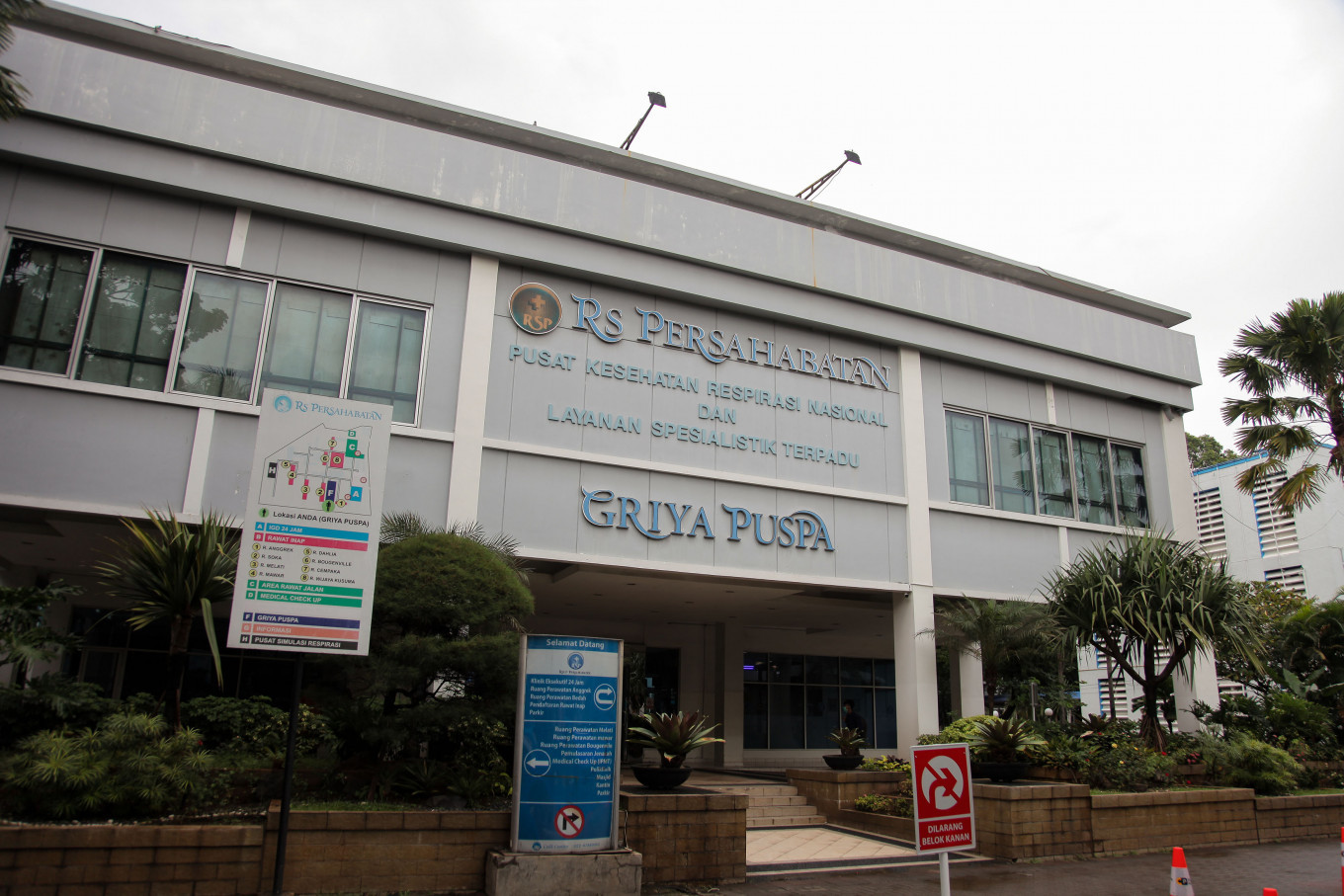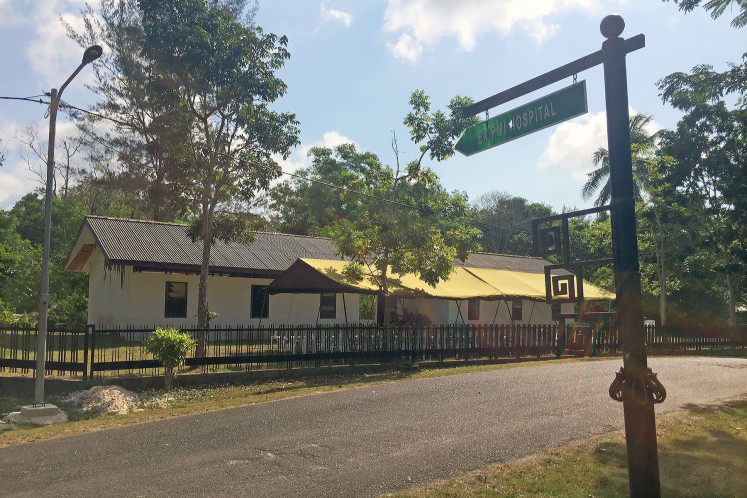Popular Reads
Top Results
Can't find what you're looking for?
View all search resultsPopular Reads
Top Results
Can't find what you're looking for?
View all search results‘It was too crowded’: Patients find it hard to get COVID-19 tests, treatment
Experts warn that if hospitals are not prepared, the death rate could spike.
Change text size
Gift Premium Articles
to Anyone
R
eports have surfaced about patients in Greater Jakarta having to wait for a long time to get tests or treatment for possible cases of the novel coronavirus disease (COVID-19) as referral hospitals face increasing strain.
Azizah, who had been in contact with a COVID-19 patient in Jakarta, went to get tested after the central government announced the confirmed case on March 14.
She went to Gatot Subroto Army Hospital, a referral center for coronavirus patients, on Monday. She waited until about 5 p.m., when the hospital told her to come back on Tuesday at 8 a.m.
“I should have been tested on Monday, but I could not get on the waiting list. It was too crowded,” she told The Jakarta Post on Tuesday. “ “[Thank God] I was scheduled to do the test at 12 p.m. today. It is better than not being treated," she said.
She said she initially intended to do the test in RSUP Persahabatan in East Jakarta, another referral hospital, as dozens of her colleagues, who also had contact with the same person, had gone there earlier.
However, she heard that people had overrun the hospital and the management had asked them to go home.
Jakarta Governor Anies Baswedan has acknowledged that a significant increase in patients seeking COVID-19 treatment has been observed over the past two months.
“Medical officers involved in COVID-19 handling are facing a heavy workload because the [number of] people coming to seek medical services has significantly increased. The focus and energy they [medical officers] give are immense,” Anies said during a press briefing on Monday.
“As a matter of fact, the past two months have been quite intense.”
The son of a patient told the Post earlier, on the condition of anonymity, that his father had to wait for hours at Persahabatan hospital only to be rejected. He called a hotline, and the hotline referred him to another referral hospital in Matraman, East Jakarta, where he was rejected as well.
Read also: COVID-19 patient rejected, waited for days for testing in Jakarta
After significant effort and emotional upheaval, his father was hospitalized and confirmed positive for the coronavirus.
Experts have warned that the number of COVID-19 cases will continue to increase in the coming weeks and that Indonesian hospitals were not ready for the significant number of patients that would come.
The Jakarta healthcare system, which has seen the most cases of COVID-19 in the country, has been overwhelmed by the need for facilities following the jump in confirmed cases over the past two weeks.
As of Monday Jakarta had 356 people under observation for possible COVID-19 infection; 191 of them were treated in the hospital while 165 others were told to go home because they were considered in good condition by the hospitals.
Fushen, a hospital management consultant who works at Krida Wacana Christian University, said that according to data from the Health Ministry there were 19,972 beds in Jakarta hospitals and only 2,051 beds for intensive treatment. Not all of the latter were isolation rooms.
If the number of people under surveillance in Jakarta increased 10 percent each day, Fushen said, in about two months Jakarta would have 75,000 patients. If 50 percent of them required hospitalization, then Jakarta alone would need at least 37,500 beds in May, said Fushen.
Fushen added that the beds available in the hospitals were not just for COVID-19 patients but also for people who had non-COVID-19 issues that needed urgent attention.
“The bed occupancy rate in Jakarta is about 60 to 80 percent, so if we assume that the occupancy rate for non-COVID cases is about 50 percent, then we only have about 10,000 beds,” he said.
Fushen asked the government to quickly establish temporary health facilities to address the capacity issues.
President Joko “Jokowi” Widodo has ordered the Public Works and Housing Ministry to renovate an abandoned building, which formerly housed Vietnamese refugees, and turn it into a hospital for COVID-19 patients. The makeshift hospital is expected to have 1,000 beds.
A leaked document obtained by The Jakarta Post on Friday showed that out of the 132 designated state referral hospitals, only 49 were “really ready”. Persahabatan Hospital has complained about a lack of ventilators to treat patients who have severe shortness of breath.
Read also: Indonesia scrambles to contain coronavirus
On Tuesday, the government reported 172 confirmed cases across the country. The Health Ministry Disease Control and Prevention director general Achmad Yurianto said that although more cases had been confirmed, not every confirmed patient had to stay at the hospital for treatment.
“Some patients with positive cases who show no symptoms will be quarantined and asked to isolate in their own houses,” he said on Monday.
Jakarta Health Agency health resources head Ani Ruspitawati said on March 9 that there were 125 hospital beds provided by eight assigned hospitals in the capital, fewer beds than the number of currently confirmed cases.
An abandoned building that once sheltered Vietnamese refugees on Galang Island in the Riau Islands province will be turned into a COVID-19 referral hospital. (JP/Fadli)With the increasing number of people seeking care, hospital managers are scrambling to find ways to improve services.
“We are in the middle of a meeting to discuss internal strategy [for COVID-19 handling],” RSUP Persahabatan director Rita Rogayah told the Post on Monday morning.
Governor Anies said the city administration would provide incentives of Rp 215,000 (US$14.27) per person to officers who directly supported the treatment of COVID-19 patients. The incentive is based on a 2019 Finance Ministry decree on 2020 standard input costs and Gubernatorial Decree No. 22/2016 on standard costs.
Nurul Nadia, a public health expert and researcher at the Center for Indonesia Strategic Development Initiatives (CISDI), warned on Tuesday that since the statistics had indicated community spread, hospitals had to be prepared or the death rate from the disease would be higher than it had to be.
“Most COVID-19 infections that are detected are mild. However, the mortality rate will spike if health services are not ready for surges in COVID-19 cases,” she said.











